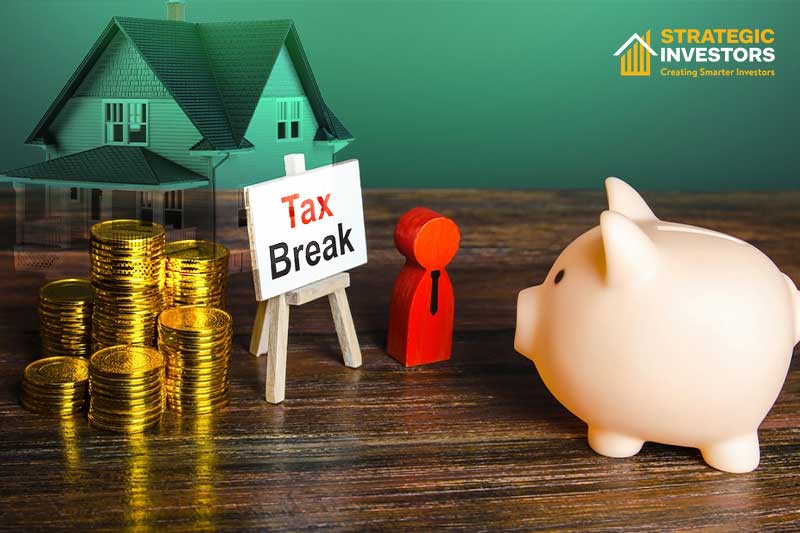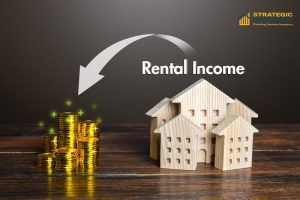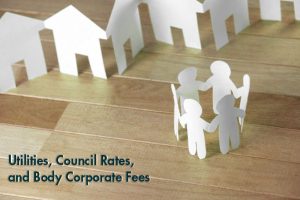
Are you looking to unlock the full potential of your investment properties in 2024?
A key aspect to consider is the various tax breaks on investment properties that can be leveraged to maximise your returns. This blog post will guide you through the essentials of maximising tax deductions, understanding new legislation changes, and ensuring compliance with the Australian Taxation Office (ATO) for your investment properties.
Let’s dive in and explore how you can achieve financial freedom through strategic property investment.
Key Takeaways
- Maximise tax deductions on investment properties in 2023 by claiming eligible rental income, property expenses and depreciation benefits.
- Understand negative gearing advantages to reduce your tax liability through offsetting rental expenses against other income.
- Stay informed of applicable laws for travel expense claims, insurance premiums coverage, record keeping requirements and ATO compliance priorities to optimise returns.
Maximising Tax Deductions for Investment Properties

Optimizing tax deductions for investment properties on your tax return calls for accurate reporting of expenses. The purpose of tax deductions, such as claim depreciation, is to reduce taxable income, ultimately allowing you to pay less tax.
Rental Income

Rental property owners can claim deductions for certain expenses annually, such as:
- Maintenance costs
- Property management fees
- Pest control expenses (eligible for an immediate investment property tax deduction on the annual return)
- Land tax (can be claimed as a tax deduction each financial year for investment properties)
Meeting tax obligations and entitlements while maximising your returns can be achieved through declaring your rental income and claiming eligible deductions.
Property Expense
Knowing what can be claimed as tax deductions is crucial when dealing with property expenses. Eligible expenses include a range of costs associated with retaining property, such as:
- Interest charged through a mortgage
- Management costs
- Land tax
- Maintenance costs
- Garden maintenance
- Advertising costs to find a tenant
- Council rates
- Strata fees
- Pest control
- Repairs and maintenance
- Insurance
- Agent fees
- Stationery
- Phone calls
- Legal expenses
All of these expenses can be covered as tax deductions.
However, not all property expenses are tax-deductible. Expenses of a capital nature, such as the total cost of improvements to a rental property, special levies for capital improvements, and legal expenses of a capital nature, are not eligible for tax deductions.
Claiming eligible property expenses can be an effective way to reduce your taxable income.
Depreciation Benefits
Depreciation benefits play a significant role in maximising tax deductions. Capital works and improvements, such as renovations and structural changes, may be eligible for tax deductions over a period of time, subject to certain criteria. This allows investors to increase cash flow and reduce taxable income by claiming deductions for the building structure and removable assets.
Maintaining a depreciation schedule for your investment property aids in ensuring compliance and optimising tax deductions. Utilising depreciation benefits contributes to the overall success of your property investment strategy by maximising your tax deductions and increasing cash flow.
Negative Gearing Advantages

Remember, tax incentives should not be the primary consideration when buying an investment property. Ensure that your investment strategy is tailored to your personal circumstances and risk tolerance. Understanding and utilising the advantages of negative gearing can potentially lead to greater financial freedom and success in your property investment journey.
Borrowing Costs and Interest Repayments

- Loan establishment fees
- Lenders’ mortgage insurance
- Stamp duty for the mortgage
- Title search fees
- Document preparation and filing fees
- Mortgage broker fees
- Valuation fees
Additionally, interest repayments on investment property loans can also be claimed as tax deductions.
However, not all borrowing expenses are tax-deductible. Principal repayments, interest on loans for private purposes, and interest paid on money borrowed for personal expenses are not eligible for a tax deduction.
Understanding and claiming eligible borrowing costs and interest repayments can help maximise your tax deductions and reduce your overall tax liability.
Capital Works and Improvements

Understanding the specific rules and regulations regarding capital works deductions is vital. These deductions must not exceed construction expenses, which include related costs such as:
- Architect fees
- Surveying fees
- Foundation excavation expenses
- Costs of building permits
Claiming capital works and improvements as tax deductions allows for further reduction of your taxable income and optimisation of your property investment returns.
Tax Deductions for Property Management

By understanding and claiming tax deductions for property management expenses, you can optimise your tax benefits and ensure compliance with relevant regulations. Claiming these tax deductions supports property investment success, as proper management of your investment property helps maintain its value and maximise returns.
Travel Expenses and Legislation Changes

Staying informed about legislation changes is vital for property investors to ensure compliance and minimise potential penalties. Understanding how these changes apply to your situation allows you to adapt your investment strategy and make informed decisions on claiming travel expenses and other tax deductions.
Legal and Accounting Fees

- Legal fees related to rental activities
- Fees connected to evicting a non-paying tenant
- Court action for loss of rental income
- Defending a damages claim regarding injuries suffered by a third party on the rental property
Accounting fees, such as those for bookkeeping, tax advice, and accountant services, are also tax-deductible. Claiming tax deductions for legal and accounting fees can effectively reduce your taxable income and optimise your property investment returns.
Utilities, Council Rates, and Body Corporate Fees

Bear in mind that utilities qualify for rental property deductions only when the property owner pays for them, not the tenant. Claiming tax deductions for utilities, council rates, and body corporate fees can further reduce your taxable income and enhance your property investment returns.
Insurance Premiums and Coverage

- Safeguards against damage to the property
- Provides coverage for loss of rent or rent default
- Offers assistance with legal expenses
- Provides coverage for theft and burglary
Obtaining landlord insurance and claiming tax deductions for insurance premiums can protect your investment property and ensure compliance with relevant regulations. This not only helps reduce your taxable income but also provides peace of mind knowing your investment is financially secure.
Record-Keeping and Documentation

- all income
- all expenses
- efforts to rent the property
- a depreciation schedule
Maintaining accurate records and documentation contributes to the success of your property investment strategy by optimising your tax deductions and ensuring compliance with the ATO.
ATO Priorities and Compliance
Investment property owners can avoid penalties and maximise tax benefits by staying informed about the Australian Taxation Office’s (ATO) priorities and compliance requirements. The ATO has indicated that they will be paying particular attention to rental property income and deductions when reviewing tax returns this year.
To ensure timely processing of your refund and compliance with ATO requirements, start preparing for the lodgement of the return in advance and consider engaging an accountant specialised in property investment.
Staying informed about ATO priorities and compliance requirements can help optimise your tax benefits and ensure the success of your property investment journey.
Summary
In conclusion, unlocking tax breaks on investment properties in 2023 can significantly enhance your property investment returns and contribute to your financial freedom. By understanding and claiming eligible tax deductions, utilising negative gearing, staying informed about legislation changes, and ensuring compliance with the ATO, you can maximise your tax benefits and achieve greater success in your property investment journey.
Frequently Asked Questions

How can I reduce my income tax on investment property?
To reduce income tax on investment property, keep clear and up-to-date records of all expenses, take advantage of capital assets and borrowing expenses deductions, track depreciation and capital works, and negatively gear the property. Additionally, be sure to claim all rental advertising costs, loan interest, council rates, land tax, strata fees, building depreciation, appliance depreciation, and repairs and maintenance.
Can you avoid tax on investment property?
You can usually avoid paying capital gains tax on investment property when you sell it if it is your primary place of residence.
How much depreciation can I claim on an investment property?
You can claim 2.5% per year depreciation on an investment property built after 15 September 1987 until it’s 40 years old. So, if your property was built in 1990 at a cost of $100,000, you would be able to claim $2,500 each year until 2030.
What types of property expenses are eligible for tax deductions?
Eligible property expenses for tax deductions include mortgage interest, management and maintenance costs, land taxes, pest control fees, repairs and insurance, and agent fees.
Are travel expenses for investment properties deductible?
Unfortunately, travel expenses related to investment properties are no longer deductible unless the individual is running a rental property business or is an excluded entity.













